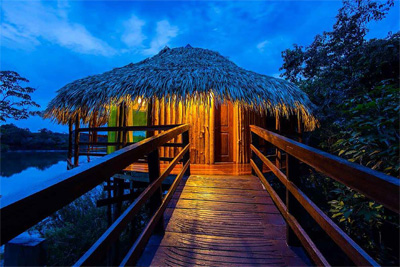IS THERE ANYWHERE truly remote in the modern world? Here’s somewhere: Juma Lodge. For two nights in this rustic stilted hotel on a tributary of the Brazilian Amazon, our laptops and cellphones were useless. Without outside distraction, we had no choice but to immerse ourselves in the immediate environment.
Such moments, such places, are increasingly rare. It is ever more difficult to throw off the clutches of communication. The demands of the outside world now follow travelers everywhere, even into the air and across oceans. Night and day, almost wherever we are in the world, we can be reached.
There is a positive flipside. Thanks to telecommunications, we are no longer tied to an office in a fixed location. Businesses operate with co-workers living and working in separate cities, even on separate continents, and individuals take their work with them to all corners of the globe. These digital nomads have thrown off the drudgery of daily routine, putting quality of life above all else. I’m one of them. I am writing these words in a café beside the Mediterranean.
I was slow to grasp the possibilities of global interconnectivity. For three decades, between travels, I dutifully returned to my home base in England to endure lousy weather and a high cost of living. In 2016 I realized I could just as easily be based elsewhere and so relocated to Javea (aka Xàbia), a small town on the coast of Spain.
I wasn’t the first to pick this particular place. On initial research, I discovered the locale already offered infrastructure and dedicated services for foreigners seeking to make a life outside the nine-to-five rat race.
Javea Business Hub, for example, is a co-working center that provides individual workspaces with super-fast internet connection for $4.20 per hour or $21 per day, as well as boardroom and video facilities. In addition, you get the benefit of networking with like-minded people.
Alternatively, for the cost of a drink, plenty of waterfront cafés offer free WiFi, such as the one I’m sitting at now, working in the fresh air with the sea lapping on the nearby pebble beach.

© ROSSHELEN | DREAMSTIME.COM
Taking the digital nomad lifestyle to the next level, Sun and Co., located in a modernized 19th-century house amid the labyrinth of narrow streets in Javea’s lovely old town, is a residential co-working community in which a private room costs $47 per night for up to a week, or $34 per night for stays of longer than a month. It’s particularly suited to those who enjoy a collegiate environment. The house offers communal living spaces and a shared kitchen, with two local hosts to keep things running smoothly and to set up free-time activities such as bike rides and sea kayaking excursions.
For many of the location-independent workers staying at Sun and Co., Javea is just one stop on an open-ended journey taking advantage of similar facilities from Costa Rica to Thailand, Estonia to South Africa.
Not every line of work lends itself to this way of life. Most digital nomads are self-employed and work either in the software industry (computer coding, web design, software support), in the creative sector (writing, graphic design), teaching English online or in various forms of consultancy.
A sizeable percentage of early digital nomads made their living producing websites or video channels chronicling their lifestyle. That market has been saturated and is no longer sustainable. Similarly, any business plan that relies on providing location-independent services to fellow digital nomads will struggle in the face of well-established competition. The trick is to adapt a real-world career into one that can operate anywhere.
The next task is to choose where. Time zones may prove a limiting factor. If you’re providing services to clients in the United States, basing yourself in Europe or Asia would involve working unsocial hours. There are also legal practicalities that vary from country to country. Which type of visa will you require? Are there restrictions on the kind of work you are permitted to do in your chosen country? How will you be paid, and where will you pay taxes?
One way to negotiate the myriad challenges is to link with other digital nomads for advice. As increasing numbers of people are drawn to the way of life, the community is becoming more focused, with dedicated online forums and even formal conferences, such as the DNX Digital Nomad Conference, held this year in Lisbon, Portugal, Sept. 9–10.
The same organization also runs regular 10-day DNX Camps at venues around the world (next up: Lemnos, Greece), at which up to 50 digital nomads share experiences and trade advice while co-working in an exotic location.

© ANTONIO GUILLEM | DREAMSTIME.COM
While for many digital nomads the great lure is absolute independence, others prefer a degree of structure. For them, there are several communal travel programs in which like-minded co-workers tour the world on a pre-determined itinerary. Remote Year, for instance, offers a 12-month itinerary for up to 75 people, each paying $2,000 per month after a $5,000 down payment. The 2017 itinerary takes in England, Croatia, Malaysia, Colombia and Morocco, among other destinations.
Another company, Hacker Paradise, runs three-month programs for up to 200 people. This year’s destinations will include Lima, Peru, and Palermo, Italy. The cost of the Italian sojourn is $750 per week for a short-term stay (two weeks) or $545 per week for a stay of a month or more.
These programs tend to be pitched to the under-40s. For those of us outside the target demographic, they provide inspiration for using the many benefits of global interconnectivity to fit our own needs.
For the first decade of my career, I expected to be incommunicado for days — sometimes weeks — whenever I traveled. Any visit to Africa, for instance, put me beyond reach as soon as I left the major cities, and within the cities exorbitant hotel rates for international calls limited me.
The extent to which the world has changed sunk in last year when I sat on the veranda of the bar at Desert Quiver Camp in the Namib Desert, Namibia. With the great red wilderness stretching empty to the horizon, I took it for granted I could check emails, upload photographs and make Facetime calls. That realization was the final impetus that propelled me to Spain.

Juma Lodge © JUMA LODGE
True remoteness is becoming much more difficult to achieve. Our two nights in Juma Lodge, deep in the Amazon, were a throwback to a simpler, more adventurous era. Severed from the outside world and stripped of our ability to relay our experiences in real time, we absorbed our surroundings fully. No instant selfies, no emails or text messages, no Facebook updates.
Memorable experiences were committed to memory: encounters with monkeys and caimans and sloths. We enjoyed freewheeling conversations in the lodge’s stilted dining room with the night sounds reverberating outside and our phones silent.
The journey back to civilization took three hours. The transition began at about the midway point. First one phone trilled, then another, then another. By the time we traversed the Amazon River itself, aiming for the hazy skyline of Manaus, we were fully reconnected to the world, with all the disadvantages and advantages that brings.
Read This Next

Introducing
FX Excursions
FX Excursions offers the chance for once-in-a-lifetime experiences in destinations around the world.
#globility
Insta FeedDaily
Apr 15, 2025Island House Newport Opens in Rhode Island
New on the scene in Rhode Island: Island House Newport, offering a swish take on luxury lodging and the city’s vibrant maritime heritage. Operated by Main Street Hospitality, this new property offers a customizable experience thanks to the option of creating various configurations in the form of connecting rooms, suites and penthouses.
Sponsored Content
Royal Air Maroc Introduces Groundbreaking Safety Video: A Captivating Invitation to Discover Moroccan Heritage
Royal Air Maroc continues to elevate the passenger experience with the launch of its new in-flight safety video — a cinematic journey that seamlessly blends essential safety instructions with a celebration of Moroccan cultural heritage.
April 2025
Apr 15, 2025Pause for a Harmonious Blend of Wellness and Nature in Hong Kong
I was illiterate when I first visited Hong Kong. Aged 17, I couldn’t understand a word of the Chinese neon signs. But 40 years later, I have changed, Hong Kong has changed, and my ability to understand the signs has changed. Now I point my phone at the unintelligible script, open a translation app, and everything magically morphs into English. The exotic becomes mundane: Shoe Store. Office Supplies. Laundry. Dentist. Insurance Broker.
Daily
Apr 15, 2025First Speakeasy in Fiji Opens
Fiji welcomed its first-ever speakeasy, Cellar & Barrel, at Sheraton Fiji Golf & Beach Resort. This new bar is dedicated to fine wine, rare whiskey and spirits, and craft cocktails, boasting more than 300 beverage labels from around the world.
Sponsored Content
Find Your Perfect Escape with Paradisus by Meliá — More Than Just All-Inclusive
Luxury travel today is about more than just beautiful accommodations — it’s about experiencing the destination. Paradisus by Meliá takes traditional all-inclusive resorts to the next level by offering indulgence with immersion, experiences and authenticity. Each resort is shaped by its location, local flavors and curated Destination Inclusive® experiences that bring you closer to the heart of the destination.
Daily
Apr 15, 2025Set Sail to These 4 Luxury Hotels with Private Boats
These four luxury resorts around the world offer private boats exclusively to guests. Head to one for a unique experience on the water.
Four Seasons Hotels Launch Safari, Island Journeys
Daily
Apr 14, 2025Daily
Apr 11, 2025Venetian Resort Las Vegas Launches Viva Las Venice
Ready to let Las Vegas surprise you again? The new Viva Las Venice campaign is a collaboration between Austin-based Preacher creative agency; Italian filmmaker and director Marco Prestini; and still photographer Justin Bettman, responsible for documenting the project in images.
Sponsored Content
A Summer Sojourn Along Europe’s Rivers with AmaWaterways
This summer, elevate your vacation experience with award-winning AmaWaterways. Offering a seamless blend of unparalleled luxury, authentic cultural experiences and unrivaled service, AmaWaterways cruises are the perfect way to uncover the heart of Europe during the sunniest season with itineraries that glide along the continent’s most iconic rivers, including the Danube, the Rhine, the Seine and the Douro.
April 2025
Apr 11, 2025Discover the World’s Natural Hot Springs and Their Dazzling Destinations
Exploring the world’s most beautiful hot springs isn’t just about relaxation. It’s about discovering places where geothermal activity sculpted surreal landscapes, where cultures turned natural heat into centuries-old wellness traditions, and where plunging into mineral-rich waters connects you to the Earth in a way few experiences can. From forested South American pools to historical U.S. bathhouses, thermal retreats offer destinations in their own right ... and the world is full of stunners.
ShareThis